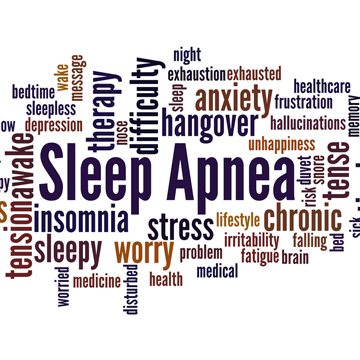 Serving patients of Erwin, Jonesborough, and Greeneville TN
Serving patients of Erwin, Jonesborough, and Greeneville TN
Certain factors can heighten your risk of obstructive sleep apnea, such as your age and your weight. The reality is, anyone of any age can develop sleep apnea – even athletes in peak physical condition. We explore this topic in greater detail today on the blog.
Get the facts on obstructive sleep apnea
Obstructive sleep apnea, or OSA, is a serious sleep breathing disorder. A person with this disorder experiences blockages of their airway. These blockages can impede the flow of air, or often stop breathing altogether. Each time someone with sleep apnea experiences a blockage, known as an apneic event, oxygen levels in the blood decrease and eventually the brain, believing that you are choking to death, sends signals to the body to resume normal breathing.
You may never consciously wake up, but the resumption of breathing brings you out of the sleep cycle and specifically deprives you of time spent in the deepest stage of sleep, which is crucial to restoring both mind and body. For someone with a severe, untreated case of sleep apnea, these blockages may occur hundreds of times to night. Just imagine, then, how sleep apnea negatively impacts your ability to breathe and get proper rest.
“I just didn’t feel rested ever”
While sleep apnea tends to affect more men than women, and can be more prevalent among people who are overweight, anyone can develop this sleep breathing disorder – even, as mentioned earlier, professional athletes. Ryan Jensen, who plays center in the NFL, was dealing with an assortment of physical problems: losing weight and strength, always feeling fatigued, and suffering from poor performance on the field.
“I’d be in bed for that long. But I just didn’t feel rested ever,” Jensen told ABC News, even if he was asleep for eight hours or longer.
An at-home sleep test revealed that Jensen had sleep apnea. He was waking up, on average, 15 times per hour due to his condition, and only getting about 90 minutes of sleep per night. Once he received a diagnosis and had the disorder treated, Jensen experienced a physical restoration.
How can a dentist help with sleep apnea?
While a sleep apnea diagnosis only can come from a qualified sleep specialist, once you’ve been diagnosed with the disorder, you can receive treatment from a sleep apnea dentist. This is a specialization of dental science that focuses on airway management and treats a case of sleep apnea by targeting the root cause – whatever is blocking the airway.
A sleep apnea dentist can treat the disorder without CPAP. Considered the most popular method of treatment, CPAP (or continuous positive airway pressure, for short) entails wearing a mask that sends a constant flow of air and maintains an open airway. Unfortunately, many sleep apnea patients struggle to adjust to CPAP or stop using the machine altogether, eventually.
Oral appliance therapy represents an alternative. The patient receives a customized night guard that has been made for maximum effectiveness, comfort, and fit. Once worn, this oral appliance brings the lower jaw forward, helping to maintain the proper resting posture – with lips and teeth together and the tongue resting gently against the palate – to maintain an open airway throughout sleep. Worn consistently, oral appliance therapy prevents the blockages that cause an apneic event, allowing the patient to get the proper rest and relaxation they have been denied.
Sleep apnea treatment in Greeneville, Erwin and Jonesborough,Tennessee
Everyone deserves a good night’s sleep. If you’ve been diagnosed with sleep apnea or you’re showing symptoms of the disorder such as loud snoring, then the team at Tusculum Dental Care can help. To schedule your consultation, call (423) 639-7575 or contact us online.
